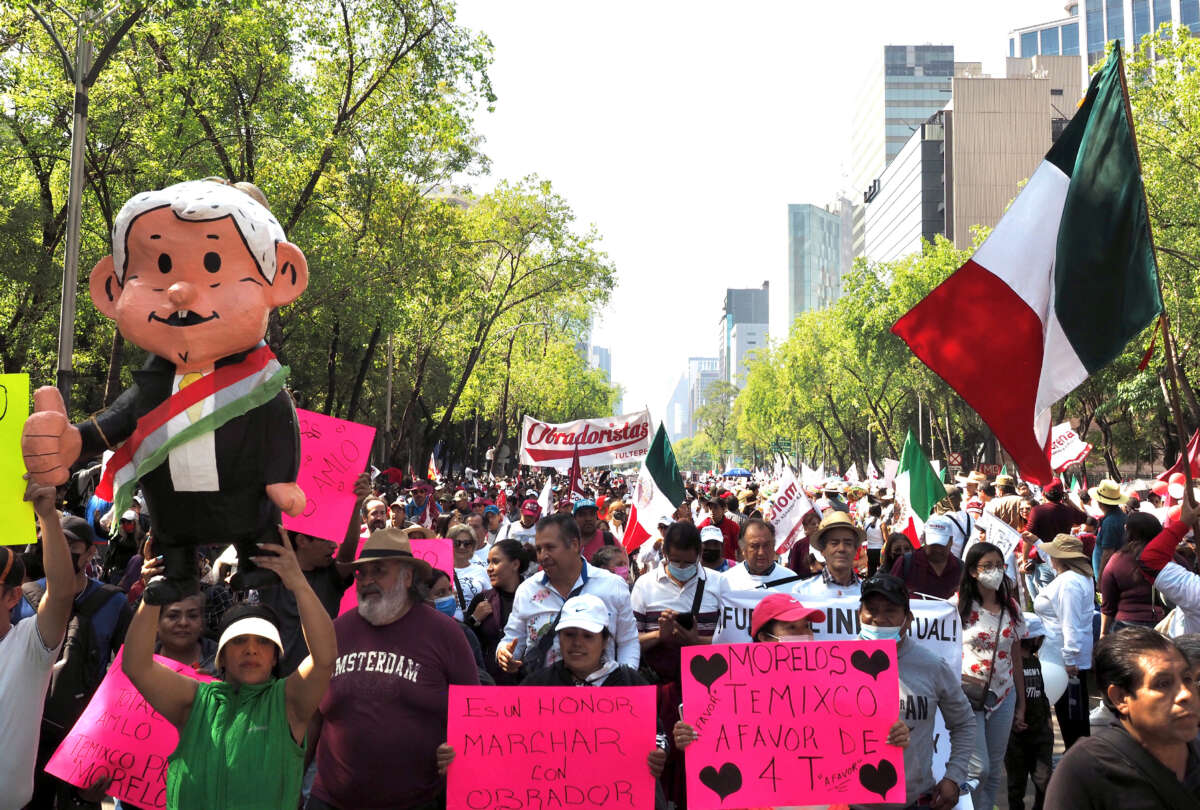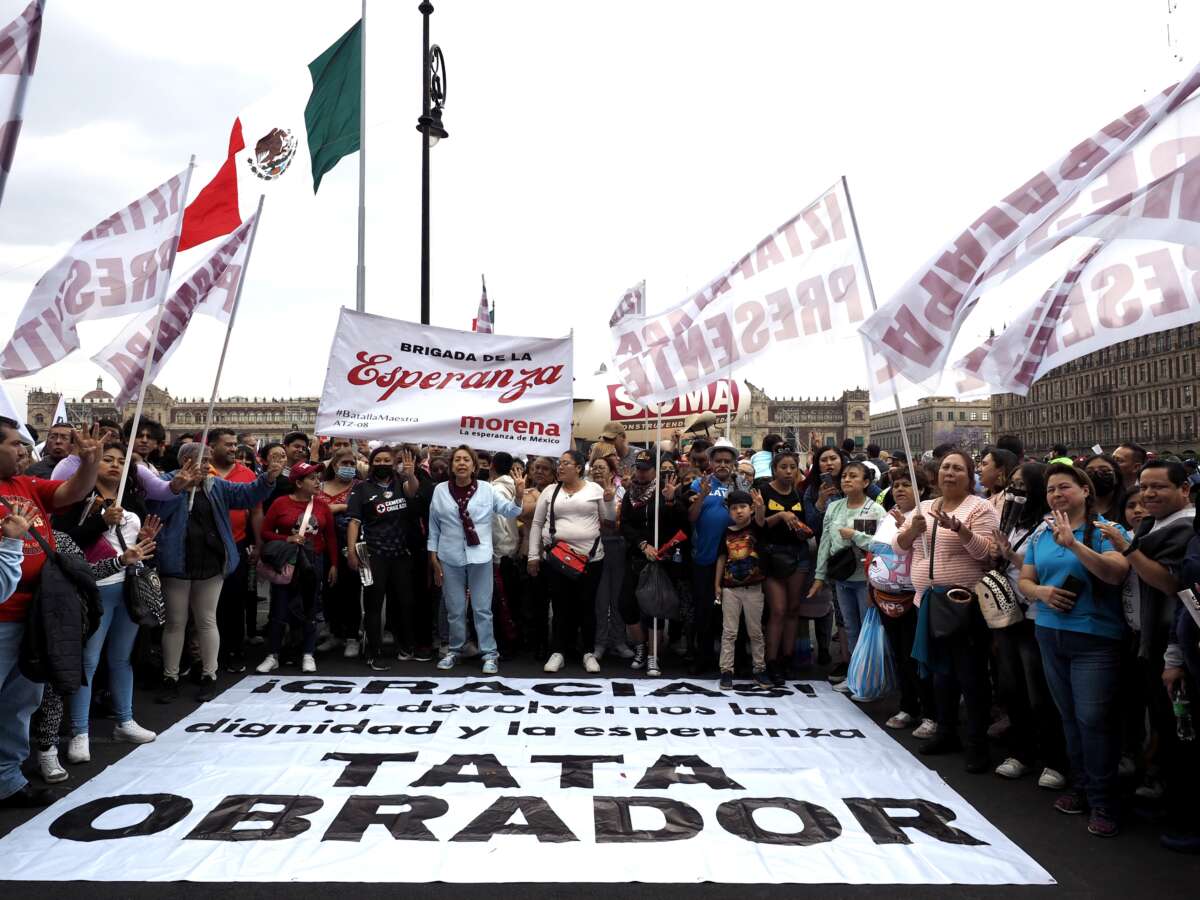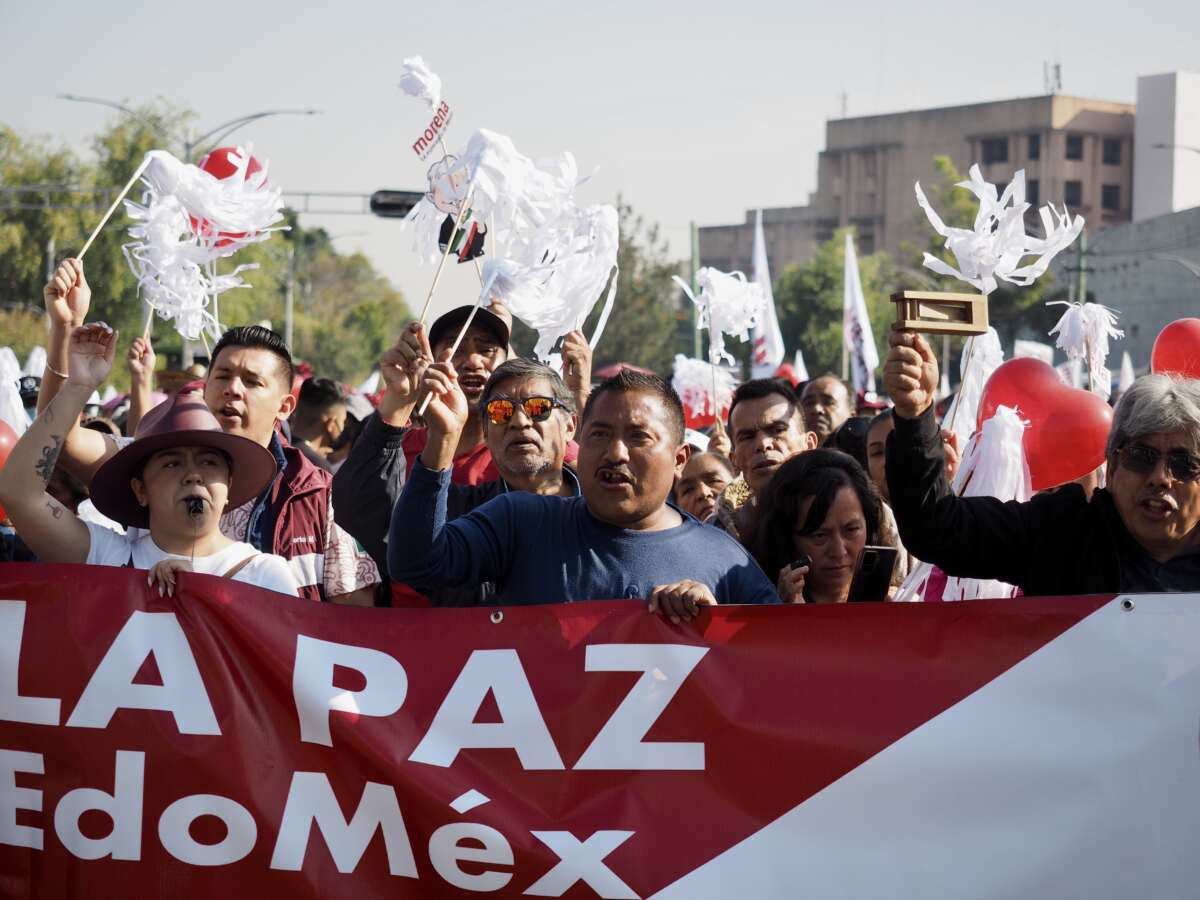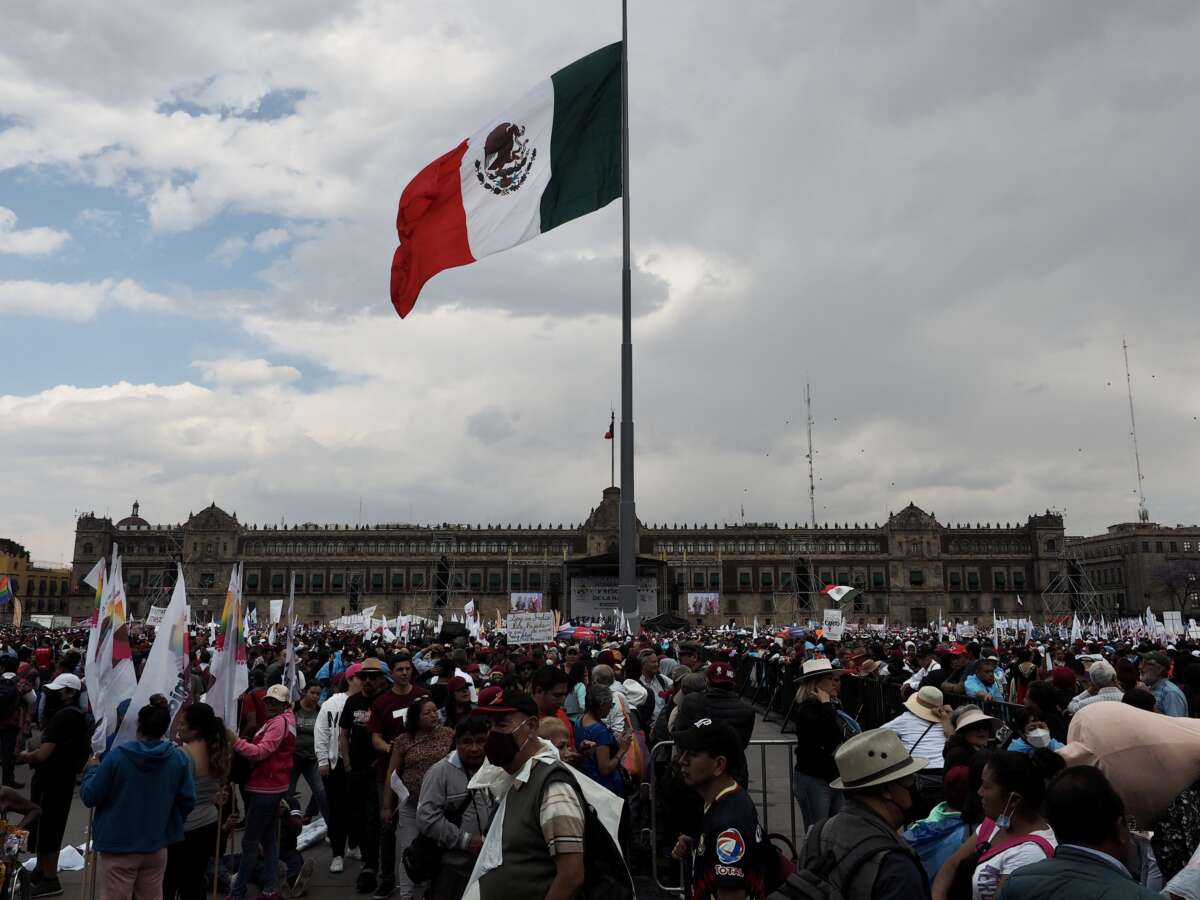~~ recommended by collectivist action ~~
Protesters heeded the Mexican president's call to defend the nation's sovereignty following attacks by U.S. politicians.

Ricardo Valdez Ponce left his house late Friday night in his hometown of Matamoros, Tamaulipas to board a bus for the 15-hour journey to Mexico City in order to take part, the next day, in the mass demonstration called by President Andrés Manuel López Obrador, known widely as “AMLO,” in defense of Mexican national sovereignty.
“I do it with great pleasure because we’ve never had a president like the one we have now. I am very proud and motivated to be here accompanying our president,” said Valdez.
Valdez was one of an estimated 500,000 people who heeded López Obrador’s call to fill the Zócalo, the giant square at the heart of the Mexican capital, to defend Mexican national sovereignty in the face of recent attacks.
March 18, 2023, was the 85th anniversary of the 1938 decree by President Lázaro Cárdenas ordering the expropriation of Mexico’s oil industry. López Obrador called on his supporters to demonstrate on that day to mark the occasion but also to convey public support for his government and policies inside Mexico and to United States politicians and pundits who have ramped up their attacks against his government.
The Mexican government has recently been subject to criticisms from U.S. politicians that it is not doing enough to combat organized crime groups and their drug trafficking efforts.
With a U.S. presidential election just around the corner, Republican politicians in particular are seeking to use Mexico and the Mexican population as a scapegoat in order to shore up their base, as was similarly done ahead of the 2016 election.
Their efforts appear to be working, as 60 percent of Republicans believe that fentanyl is primarily being smuggled by “unauthorized migrants” across the U.S.-Mexico border. In reality, it is brought into the country overwhelmingly by U.S. citizens.
A group of Republicans are seeking to designate organized crime groups in Mexico as Foreign Terrorist Organizations, which would open the possibility for further U.S. military action. Thus far the Biden administration has resisted those calls, however on March 22, U.S. Secretary of State Antony Blinken said the administration would “consider” the proposal.
Former President Donald Trump, who is gearing up for another run at the White House, has also called for U.S. military action against cartels. Meanwhile, Texas State Rep. Dan Crenshaw introduced legislation authorizing military force targeting drug cartels in Mexico.
Patricia Escamilla, a researcher and expert in binational security cooperation, told Truthout that proposals that call for the Authorization for Use of Military Force against cartels in Mexico are politically motivated and are unlikely to secure the necessary support from U.S. congressional leadership to pass into law.
Calling AMLO the “cartels’ chief enabler,” former U.S. Attorney General Bill Barr went one step further, calling for unilateral military action by U.S. forces inside Mexico and claiming international law provides a legal basis for this invasion in a March 2 Wall Street Journal op-ed. Elsewhere, former U.S. Secretary of State Mike Pompeo called for drone strikes inside Mexican territory against the cartels.
Escamilla told Truthout that any U.S. military action, including the use of drones, would require explicit support from the Mexican government and armed forces, and unilateral military action by the U.S. would damage the bilateral relationship.
“It would cause instability. The United States would lose what it has always valued in the bilateral relationship,” said Escamilla.
President López Obrador has already rejected U.S. military action, stating outright that he would not allow foreign armed forces to operate inside Mexican territory.
“In addition to being irresponsible, it is an offense to the people of Mexico,” the president declared during a news conference earlier this month.
In his speech at the March 18 rally, López Obrador did not abstain from issuing a direct warning to U.S. politicians seeking to intervene in Mexico’s affairs, closing his address to the crowd with a rousing call rejecting foreign intervention.
“From here, from this Zócalo square, the political and cultural heart of Mexico, we remind those hypocritical and irresponsible politicians that Mexico is an independent and free country, not a colony or a protectorate of the United States, and that they can threaten to perpetrate any offense, but we will never, ever allow them to violate our sovereignty and trample on the dignity of our homeland!” López Obrador declared to the roaring crowd.

Hostile Foreign Media
In recent weeks there have also been a bevy of opinion pieces and editorials in U.S. media criticizing AMLO.
Critics such as The Atlantic’s David Frum and Anne Applebaum, and the Brookings Institution’s Valerie Wirtschafter and Arturo Sarukhán, have alleged that AMLO is undermining democracy in Mexico and taking the country back into its “authoritarian past” over recently approved legislation involving modest reforms to the country’s National Electoral Institute. The attacks against the Mexican president haven’t been limited to the opinion pages either — mainstream news coverage has also depicted the law in a negative light, with journalists such as The New York Times’ Natalie Kitroeff claiming it was an effort to “undermine the country’s fragile institutions.”
The National Electoral Institute was first known was the Federal Electoral Institute, a body created in 1990 in response to demands from civil society for a more transparent electoral system after widespread accusations of fraud in the 1988 election. A subsequent reform in 2014 changed its name to the National Electoral Institute, or INE by its Spanish acronym. It has been praised for its technical capacity and professionalized service but has been heavily criticized, especially by AMLO’s supporters, for its lavish spending and excessive budget. It is the most expensive electoral authority in the region.
Far from undermining the autonomy of the INE, the law mostly mandates cost-saving measures by eliminating redundant posts at the local and district level; it expands voting rights for marginalized populations by facilitating voting for people with disabilities, people jailed awaiting trial, and migrants living abroad; and also explores the possibility of electronic voting. The law also limits the ability of the INE to exclude political candidates. This last measure was implemented after the INE canceled the registration of two candidates from AMLO’s left-wing political party MORENA for governorships in 2021 — Félix Salgado Macedonio in Guerrero and Raúl Morón Orozco in Michoacán — over relatively minor violations of electoral law, which MORENA supporters viewed as political retaliation.
With the Biden administration putting an increased emphasis on the need to “renew democracies,” these criticisms of AMLO’s alleged authoritarianism have resonated with a certain audience inside the U.S., putting a strain on the U.S.-Mexico relationship. U.S. Senate Foreign Relations Committee Chairman Bob Menendez issued a joint statement with House Foreign Affairs Committee Chairman Michael McCaul alleging that the recently approved law “had imperiled the future of its country’s democratic institutions.”
In his one-hour speech on Saturday, López Obrador indirectly responded to these accusations, sharing the history behind the nationalization of the oil industry by Mexican President Lázaro Cardenás, in particular highlighting the U.S.-Mexico relationship and praising then-U.S. President Franklin Delano Roosevelt for respecting Mexico’s sovereignty and not protesting the expropriation of U.S. assets, calling him “one of the finest presidents that country has ever had in its history.”
MORENA President Mario Delgado told Truthout that the decision to mobilize the party’s supporters on this historic date was deliberate and aimed at sending a message abroad.
“We want them to see that the president is backed by the people, that he is not alone. He is a patriotic president because he is interested, just like the people, in defending national sovereignty,” said Delgado. “We defend our sovereignty.”

Demonstrations and Counterdemonstrations
Adorning one of the buildings facing the Zócalo square was a large banner featuring the faces of three Mexican presidents, each of whom made the decision to nationalize natural resources with the stated aim of using them for the benefit of the country and its people. On the left was Lázaro Cardenás, responsible for the expropriation of the oil industry in 1938, on the right was Adolfo López Mateos who nationalized the country’s electricity industry in 1960, and in the middle was López Obrador, who nationalized the lithium industry in 2022.
The banner was an effort to convey a sense of continuity between these popular policies and those of the “Fourth Transformation,” the moniker used by López Obrador to describe his effort to radically reorient government policies away from the neoliberalism that dominated politics in the country for decades.
From the beginning of his term, AMLO has said that his goal was to “rescue” the state-owned oil company, PEMEX, and the Federal Electricity Commission in order to use them to redistribute wealth and drive economic development in the country. This policy marked a reversal of the reforms implemented by his predecessors that sought to open up these industries to private and foreign investment, provoking the ire of international investors and the opposition that had supported these privatization efforts. López Obrador has expanded direct cash-transfer programs, saying in his speech that, as of 2023, 71 percent of Mexican households benefit from at least one social program.
“We in MORENA feel we are the heirs of those struggles. Our heritage is the fight for social rights, for political rights,” David Pérez Nava, a member of MORENA’s political education institute, told Truthout.
“That is why we connect ourselves to these old struggles. Although they are from the past, they are still very present because even today it is still necessary to defend everything that Cárdenas fought for, what Mateos fought for, what [Mexican revolutionary Francisco “Pancho”] Villa and [Mexican revolutionary Emiliano] Zapata and so many other popular leaders also fought for,” he added.

Although López Obrador consistently polls among the world’s most popular leaders, he has faced serious criticism from Indigenous communities and the extra-parliamentary left in Mexico for his support for extractivist projects that encroach on Indigenous peoples’ territories, in particular his Tren Maya project in the Yucatán Peninsula that critics say will cause irreparable harm to a sensitive ecological area.
For their part, Mexico’s right-wing political opposition has tried to discredit these mass pro-government rallies, alleging that people only attend because they are offered incentives to go and that public-sector workers are forced to go due to fear of reprisals. The effort to delegitimize participation is so common that often people will bring signs explicitly stating that they are attending out of their own free will.
The political opposition — mostly comprised of the Institutional Revolutionary Party and the National Action Party, which have alternated in power since the end of one-party rule in 2000 — now finds itself compelled to mobilize in the streets as well. However, the opposition has struggled to engage citizens and win support for their political parties. After the 2018 election that saw López Obrador win a landslide victory, the leadership of the opposition struggled to adapt to the new political reality and has steadily lost political terrain to MORENA. Since 2018, the ruling party has won 12 of the 15 governor races in Mexico and now controls a total of 20 of the country’s 32 states.
However, the issue of reforms to the INE has resonated among some parts of the population, particularly the country’s middle class, and the opposition, together with civil society groups that oppose AMLO’s agenda, successfully organized two large demonstrations rejecting AMLO’s proposals. In both instances, however, the opposition’s demonstrations were met with even larger ones by government supporters.
For MORENA political education institute member Pérez, these counter rallies are an important means to show that López Obrador’s government has widespread support.
“I think it is very important that [the opposition knows] that there is a population here who is defending a national project that is popular, that is from the left, that is progressive, and that is trying to do what is best for everyone,” said Pérez.
No comments:
Post a Comment